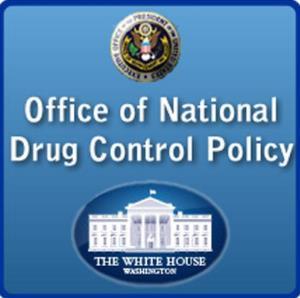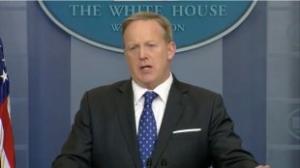There were some ominous words spoken in the press briefing room Thursday.
The president charges into the fray, but his rhetoric doesn't jibe with facts.
Hints of a crackdown on legal marijuana keep coming, but the Trump administration may want to think again.
The North Dakota legislature continues to muck about with the state's new voter-approved medical marijuana law, North Carolina sees a full-fledged medical marijuana bill introduced, and more.
A Seattle cop gets his hand slapped for doing dope with his stripper girlfriend, a Mississippi deputy is in trouble for carrying a load of dope around in his patrol car, two Detroit narcs finally face justice, and more.
Yet another national poll has a strong majority for marijuana legalization, Trump administration cost-cutters eye the drug czar's office, Arizona legalizers refine their 2018 initiative, and more.
The uproar is deafening in the wake of White House press secretary Sean Spicer's hint Thursday that Trump could crack down on legal weed, Virginia's governor signs a needle exchange bill into law, the Arizona House unanimously passes asset forfeiture reform, and more.
Fatal heroin overdoses have quadrupled in five years, elected officials in legal marijuana states push back on Trump threats, Philly civil asset forfeiture lawsuit wins class action status, and more.
Ominous noises from AG Sessions on marijuana and drug policy, asset forfeiture reform advances in three states, the feds threaten to shut down the Las Vegas Cannabis Cup, and more.
The Trump administration's posture toward drug and marijuana reform is becoming evident, Philippines President Duterte is reenlisting the National Police in his drug war, the Colombian government and the FARC are working together on coca crop substitution, and more.
Houston decriminalizes -- sort of -- Colorado ponders social cannabis clubs, Georgia legislators have passed two different CBD bills, Oregonians are ready to defelonize drug possession, and more.
This article was produced in collaboration with AlterNet and first appeared here.
Marijuana legalization advocates and the legal marijuana industry have been on tenterhooks ever since Donald Trump won the White House last November, and increasingly so since he nominated drug warrior former senator Jeff Sessions as his attorney general, the highest law enforcement officer in the land.
But for the three months since the election and the month since Trump took office, the Trump administration has had little to say on the topic. Until now.
At the administration's press briefing Thursday, White House press secretary Sean Spicer hinted that the Trump administration will step up enforcement of federal marijuana prohibition.
"I do believe that you’ll see greater enforcement," Spicer said, while adding the exact policy is "a question for the Department of Justice."
Spicer also suggested that any crackdown wouldn't apply to medical marijuana, saying that Trump believes it can "comfort" people suffering from illnesses. But, Spicer said, Trump views recreational marijuana as linked to heroin and prescription opioid use -- even though evidence suggests the opposite.
Spicer's comments are especially worrisome given Sessions' coy responses to questions during his nomination hearings about what he would do about weed. The former Alabama Republican senator said he couldn't ignore federal laws prohbiting marijuana, but that he would have to use "good judgment about to handle these cases."
But any action against legal recreational marijuana will be at odds with public sentiment. A Quinnipiac poll released Thursday had support for marijuana legalization at 59% and -- more critically for administration political calculations -- support for the feds butting out of legal marijuana states at 71%.
back to top
In his inaugural address to Congress Tuesday night, President Trump echoed the ghosts of Richard Nixon and Ronald Reagan -- not to mention summoning the specter of Miguel Cervantes -- as he vowed to defeat drugs.
If there is a silver lining, his ire appears directed at heroin and other hard drugs. The word "marijuana" did not appear once in his speech."Our terrible drug epidemic will slow down and ultimately, stop," he promised as part of a litany of MAKE AMERICA GREAT AGAIN accomplishments to come. ("Dying industries will come roaring back to life. Heroic veterans will get the care they so desperately need…")
And, having forgotten -- or more likely, never learned -- the lessons of the past half century of American drug prohibition, he's going to defeat drugs the old-fashioned way: with more war on drugs.
"To protect our citizens, I have directed the Department of Justice to form a Task Force on Reducing Violent Crime," Trump said. "I have further ordered the Departments of Homeland Security and Justice, along with the Department of State and the Director of National Intelligence, to coordinate an aggressive strategy to dismantle the criminal cartels that have spread across our Nation."
But talk is cheap. Drug law enforcement costs money. The DEA and other federal agencies are already waging a multi-billion dollar a year war on drugs; if Trump's budget proposals match his rhetoric, he will have to be prepared to spend billions more. Just when he wants to cut just about all federal spending but defense, too.
Trump can ratchet up the drug war in some ways without relying on congressional appropriations through his control of the executive branch. For instance, his Justice Department could direct federal prosecutors to seek mandatory minimum prison sentences in most or all drug cases, a practice eschewed by the Obama Justice Department. That, too, has budgetary consequences, but until some time down the road.
Trump did at least pay lip service to addressing drug use as a public health issue, saying he would "expand treatment for those who have become so badly addicted," but that doesn't gibe with his call to repeal the Affordable Care Act. If Obamacare is repealed, nearly three million Americans with addiction disorders with lose access to some or all of their health coverage, including nearly a quarter million receiving opioid addiction treatment.
Trump's Tuesday night crime and drug talk was interwoven with talk about the border, comingling immigration, drugs, and his border wall in a hot mess of overheated, but politically useful, rhetoric.
"We've defended the borders of other nations, while leaving our own borders wide open, for anyone to cross -- and for drugs to pour in at a now unprecedented rate," he said, ignoring the quadrupling in size of the Border Patrol in the past 20 years and the billions pumped into border security since 2001. "We will stop the drugs from pouring into our country and poisoning our youth."
Trump also said that he was already making America safer with his immigration enforcement actions.
"As we speak, we are removing gang members, drug dealers and criminals that threaten our communities and prey on our citizens. Bad ones are going out as I speak tonight and as I have promised," he said.
It's too early to see who is actually being deported in the opening days of the Trump administration, but if the past is any indicator, it's not "gang members, drug dealers, and criminals," but, in rank order, people whose most serious crime was crossing the border without papers, alcohol-impaired drivers, other traffic violators, and pot smokers. Those were the four leading charges for criminal immigration deportations in one recent year, according to Secure Communities and ICE Deportations: A Failed Program?
Trump's drug war rhetoric is triumphalist and militaristic, but so far it's largely just talk. The proof will be in budget proposals and Justice Department memoranda, but in terms of progressive drug policy, he's striking a very ominous tone. This does not bode well.
back to top
White House press secretary Sean Spicer's comment last week that we "will see greater enforcement" of federal marijuana prohibition has set off tremors in the pot industry, but it should be setting off warning bells at the White House itself.

Going after legal marijuana will have serious political and economic ramifications. (Wikimedia/Gage Skidmore)
Any move against marijuana would be politically fraught, economically foolish, and counter to some of the Trump administration's other expressed goals, such as fighting Mexican drug cartels and creating American jobs right here in America.
Here are five reasons the Trump administration needs to think twice before its meddles with legal marijuana:
1. Legal marijuana is way more popular than Trump is. A Quinnipiac poll released last week is only the latest of a long series of polls in recent years showing majority support for marijuana legalization. That poll had nearly three out of five Americans -- 59% -- down with freeing the weed. And more directly to the political point, an even higher number -- 71% -- want the federal government to butt out in states where it is legal. Trump, meanwhile, is polling in the thirties or forties in personal popularity polls. And we know he wants to be liked.
2. Trump can't make legal marijuana go away; he can only mess it up. Even if Jeff Sessions lives up to marijuana industry nightmare scenarios by successfully shutting down pot businesses and preventing states from taxing and regulating it, marijuana possession and cultivation for personal use will remain legal under state law. The federal government cannot force state and local police to enforce federal marijuana prohibition and it does not have the resources to effectively do so itself. People will continue to grow and possess pot in legal states, and continue to sell it -- only now all that activity will return to the black market.
3. Legal marijuana is a job creation dynamo. The marijuana industry already employs more than 100,000 people and, if left unimpeded, would create more jobs than manufacturing by 2020, according to a recent report from New Frontier Data. That report projects that 250,000 jobs would be created in the industry by 2020, while Bureau of Labor statistics project than 800,000 manufacturing jobs are going to vanish by 2024. And new jobs are way more likely to pop up in marijuana processing operations than in coal fields.
4. Legal marijuana is a tax bonanza for the states. In Colorado, the state took in $200 million in pot tax revenues in 2016, using it for schools and public health and safety, Oregon took in $60 million, and Washington saw $35 million in the last fiscal year. In California, the Legislative Analyst's Office estimates legal weed will generate $1 billion in tax revenues per year. An awful lot of fiscal conservatives are very happy to see those revenues.
5. Legal marijuana hurts drug cartels. If the Trump administration wants to hurt Mexican drug trafficking organizations, the so-called cartels, not interfering with legal competition from this side of the border is a good way to do that. Mexican brick weed is not, of course, the sole source of cartel revenues, but it is a significant one, accounting for perhaps a fifth of cartel receipts, and legalization is hurting cartel marijuana exports. Seizures at the border have dropped by nearly two thirds in recent years, from a high of 3.5 million pounds in 2009 to only 1.5 million pounds in 2015, and there are many stories of Mexican pot farmers being driven out of business by competition from the north.
back to top
The North Dakota legislature continues to muck about with the state's new voter-approved medical marijuana law, North Carolina sees a full-fledged medical marijuana bill introduced, and more.
Iowa
Last Thursday, a CBD expansion bill stalled. A bill that could have expanded the use of CBD cannabis oil ran into a brick wall in the House Public Safety Committee. Committee Chair Rep. Clel Baudler (R-Greenfield) said he had to pull House Study Bill 132 because there wasn't enough support from Republicans to get it out of committee.
North Carolina
Last Wednesday, a fill-fledged medical marijuana bill was filed. House Democrats Wednesday introduced House Bill 185, a full-fledged medical marijuana bill that contains generous provisions on the amount of marijuana patients may possess (up to 24 ounces or "an adequate supply" as determined by a physician) and grow (up to 250 square feet of canopy), as well as providing for caregivers and establishing a system of dispensaries and commercial medical grows. Similar bills died in the 2015-2016 session, with one issued an "unfavorable report," meaning its subject matter could not be considered by the House for two years.
North Dakota
Last Wednesday, the Senate okayed changes to the voter-approved medical marijuana law. The Senate voted to approve Senate Bill 2344, which imposes tougher restrictions and more oversight than the initiative approved by voters in November. The bill sets steep fees for patients and providers and allows the Health Department to inspect patients' homes with 24-hour notice and medical marijuana facilities with no notice. On the upside, it also allows for smoking medical marijuana and lowers the age for classification as minor from 21 to 19. The bill now heads to the House.
[For extensive information about the medical marijuana debate, presented in a neutral format, visit MedicalMarijuana.ProCon.org.]
back to top
A Seattle cop gets his hand slapped for doing dope with his stripper girlfriend, a Mississippi deputy is in trouble for carrying a load of dope around in his patrol car, two Detroit narcs finally face justice, and more. Let's get to it:
In Jackson, Mississippi,
a Hinds County sheriff's deputy was arrested last Thursday after investigators discovered a bunch of dope in his patrol car. Deputy Larry Taylor, 31, was charged with possession of a controlled substance with intent to deliver. He's the brother of a Hinds County jail guard, Brodrick Taylor, who was recently busted for smuggling drugs into the jail. Deputy Taylor is now a former deputy, too.
In Detroit, two former Detroit narcotics officers were sentenced last Wednesday to years in prison for a pattern of ripping off some drug dealers, tipping off others, and forging search warrants. Former Lt. David Hansberry was sentenced to 12 years, while former Officer Bryan Watson got nine years. They were both convicted last summer of conspiracy, although the jury acquitted them of numerous other counts, including actual extortion. Federal prosecutors had sought 20 years for each man. They both remain free on bond.
In Blackfoot, Idaho, a former Blackfoot police officer was sentenced last Wednesday to 180 days in jail for stealing drugs and paraphernalia from a drug take-back box. Paul Hardwicke had copped to one count each of drug and paraphernalia possession. Hardwicke's attorney said he suffered depression and PTSD and was strung out on opiates.
In Seattle, a Seattle police officer was sentenced Monday to 30 days on a jail work crew after he was caught providing and doing drugs with a stripper girlfriend and illegally giving crime victim information to a local news anchor. Officer Robert Marlow pleaded guilty to drug possession and computer trespass charges.
back to top
Yet another national poll has a strong marjority for marijuana legalization, Trump administration cost-cutters eye the drug czar's office, Arizona pot legalizers refine their 2018 initiative, and more.

Going, going, gone?
Quinnipiac Poll Has Support for Legalization at 59%. A new Quinnipiac poll has support for marijuana legalization nationwide at 59%, with an even larger number -- 71% -- saying the federal government should respect state marijuana laws. The poll also finds support for medical marijuana at stratospheric levels, with 93% in support.
Arizona Initiative Campaign Refines Its Proposal. Safer Arizona has refiled its marijuana legalization initiative after receiving criticism of some parts of it after it was originally filed last week. The new version adds a mandatory 1,000-foot buffer between schools and marijuana operations, makes it a crime -- not a civil offense -- to sell marijuana to minors, makes possession by minors a crime, but with only a $50 civil fine for a first offense, and allows local authorities to impose "reasonable zoning restrictions." The initiative needs 150,000 valid voter signatures by July to qualify for the 2018 ballot.
Wyoming Marijuana Edibles Penalties Bill Gets Tightened. A bill that originally created a tiered penalty system for both marijuana and marijuana edibles earlier had its provisions relating to marijuana removed, and now a Senate committee has further tightened the bill to make possession of more than three grams of edibles a felony and has increased the period for which past offenses would be considered from five years to 10 years. The committee taking a hatchet to House Bill 197 is the Senate Judiciary Committee. The bill had passed the House largely intact.
Medical Marijuana
North Dakota Senate Okays Changes to Voter-Approved Medical Marijuana Initiative. The Senate voted Wednesday to approve Senate Bill 2344, which imposes tougher restrictions and more oversight than the initiative approved by voters in November. The bill sets steep fees for patients and providers and allows the Health Department to inspect patients' homes with 24-hour notice and medical marijuana facilities with no notice. On the upside, it also allows for smoking medical marijuana and lowers the age for classification as minor from 21 to 19. The bill now heads to the House.
Drug Policy
Trump Considers Eliminating ONDCP, the Drug Czar's Office. The White House Office of Management and Budget has proposed cutting nine government programs, including the Office of National Drug Control Policy (ONDCP -- the drug czar's office). Unsurprisingly, the move is generating pushback from law enforcement, the drug treatment complex, and some legislators. Stay tuned.
Drug Testing
Arkansas Welfare Drug Testing Bill Passes House. A bill that would make permanent a pilot program requiring people seeking help from the Temporary Assistance for Needy Families (TANF) program to undergo drug screening and drug testing if deemed likely to be using drugs has passed the House. Senate Bill 123 has already passed the Senate, but now goes back for a housekeeping vote before heading to the governor's desk. The bill passed even though state Health Department officials testified that only two people had actually failed the drug test under the pilot program.
International
Edmonton Awaits Approval of Safe Injection Sites from Canadian Government. The province of Alberta and the city of Edmonton are ready to move ahead with safe injection sites and are now awaiting federal government approval. Local officials unveiled the locations of the proposed sites Wednesday. Last year, the Alberta government announced it would seek a federal exemption to set up "medically supervised injection services," and now it awaits action from the Liberal government in Ottawa.
back to top
The uproar is deafening in the wake of White House press secretary Sean Spicer's hint Thursday that Trump could crack down on legal weed, Virginia's governor signs a needle exchange bill into law, the Arizona House unanimously passes asset forfeiture reform, and more.

Needle exchange programs are coming to Virginia under a new law just signed by the governor. (Creative Commons/Wikimedia)
Marijuana Industry, Advocates React to Spicer Threat. White House press secretary Sean Spicer's statement Thursday that he expects the Justice Department to crack down on recreational marijuana in states where it is legal has excited a firestorm in the industry and among advocates. "To have Mr. Spicer say in one sentence that they're a states' rights administration and in the very next sentence say they're going to crack down... it just defies logic," said Robert Capecchi, director of federal policies for the Marijuana Policy Project, an organization that lobbies for pot-friendly changes to drug-related legislation. Click on the link for more reaction.
Medical Marijuana
North Carolina Medical Marijuana Bill Filed. House Democrats Wednesday introduced House Bill 185, a full-fledged medical marijuana bill that contains generous provisions on the amount of marijuana patients may possess (up to 24 ounces or "an adequate supply" as determined by a physician) and grow (up to 250 square feet of canopy), as well as providing for caregivers and establishing a system of dispensaries and commercial medical grows. Similar bills died in the 2015-2016 session, with one issued an "unfavorable report," meaning its subject matter could not be considered by the House for two years.
Asset Forfeiture
Arizona House Unanimously Passes Asset Forfeiture Reform Bill. The House voted unanimously Thursday to approve House Bill 2477, which sets a higher evidentiary standard for prosecutors to overcome before they can seize cash or property under civil asset forfeiture. Currently, prosecutors need prove only "a preponderance of the evidence," but under this bill, they would have to provide "clear and convincing evidence" the property or cash was linked to a crime. The bill doesn't abolish civil asset forfeiture, but does tighten it. It would also bar prosecutors from doing an end-run around state laws by passing cases off to the feds. The bill now heads to the Senate.
Harm Reduction
Virginia Governor Signs Needle Exchange Bill. Gov. Terry McAuliffe (D) has signed into law House Bill 2317, which authorizes the state health commissioner to establish and operate needle exchange programs after declaring a public health emergency. Health Commissioner Dr. Marissa Levine and Gov. McAuliffe declared that emergency last year.
International
Bolivian Congress Approves Near Doubling of Legal Coca Cultivation.The lower house approved a bill Thursday that would nearly double the amount of land allowed for legal coca cultivation, and the Senate approved it Friday. The bill would allow farmers to plant up to about 50,000 acres with coca, up dramatically from the 30,000 acres currently allowed. Even that new, higher limit was too much for some coca farmers, who want no limits, and clashed violently with police earlier this week.
back to top
Fatal heroin overdoses have quadrupled in five years, elected officials in legal marijuana states push back on Trump threats, Philly civil asset forfeiture lawsuit wins class action status, and more.

Truth in advertising? Branded heroin seized by the New Jersey State Police.
Elected Officials From Legal Marijuana States Slam Notion of Crackdown. White House press secretary Sean Spicer's announcement last Thursday that the Trump administration was thinking of going after legal marijuana continues to generate sharp pushback. On Sunday, Colorado Gov. John Hickenlooper (D) said now was "the wrong time to pull back" and that a federal crackdown would create "a level of conflict that's going to be very difficult." Meanwhile, Oregon Sen. Ron Wyden (D) called on the administration to "respect the decisions of Oregon voters."
Michigan Legalization Initiative a Compromise Effort, Draft Language Now Available. A number of Michigan marijuana legalization stakeholders have come together to create a draft of a proposed 2018 initiative. The draft includes a 12-plant personal cultivation limit, would limit initial business licenses to existing medical marijuana businesses, and would include "microbusiness" licenses for small commercial grows, among other provisions. The effort is being led by the Marijuana Policy Project, which has been consulting with MINORML, MILegalize 2018 (the folks behind a 2016 effort that came up just short on signature gathering), the Michigan Cannabis Coalition, the Michigan ACLU and others. MPP hopes to have a final draft to present to state officials by late April.
Virginia Legislature Approves Bill to End Driver License Suspensions for First-Time Marijuana Possession. The General Assembly passed House Bill 2051 last Friday. Under the bill, first-time pot possession offenders will not have their licenses automatically suspended for six month. Instead, a judge has the option of ordering them to do 100 hours of community service. Minors would still see their licenses automatically suspended, as would people caught indulging while driving. The bill now goes to the desk of Gov. Terry McAuliffe (D).
Medical Marijuana
Iowa CBD Expansion Bill Stalled. A bill that could have expanded the use of CBD cannabis oil ran into a brick wall in the House Public Safety Committee last Thursday. Committee Chair Rep. Clel Baudler (R-Greenfield) said he had to pull House Study Bill 132 because there wasn't enough support from Republicans to get it out of committee.
Heroin and Prescription Opioids
Fatal Heroin Overdoses Quadrupled in Five Years. A report from the Centers for Disease Control and Prevention (CDC) finds that fatal heroin overdoses jumped from 3,000 in 2010 to more than 12,000 in 2015, a four-fold increase. Heroin killed slightly more people than prescription opioids. The highest drug overdose death rates were in West Virginia, New Hampshire, Kentucky, and Ohio, the study found.
Asset Forfeiture
Lawsuit Challenging Philadelphia Civil Asset Forfeitures Wins Class Status. A federal judge has granted class certification to plaintiffs suing the city of Philadelphia over its civil asset forfeiture program. The plaintiffs are arguing that the program creates an unconstitutional conflict of interest for law enforcement agencies, and the granting of class certification "means that the four named plaintiffs can officially represent the tens of thousands of property owners with asset that have been seized in the past five years," said Institute for Justice attorney Darpana Sheth, who is representing the plaintiffs. Philadelphia prosecutors have filed more than 20,000 civil forfeiture actions since April 2012, the beginning date for the lawsuit.
back to top
Ominous noises from AG Sessions on marijuana and drug policy, asset forfeiture reform advances in three states, the feds threaten to shut down the Las Vegas Cannabis Cup, and more.

Attorney General Jeff Sessions has more than just weed on his mind. (theleafonline.org)
Sessions Makes Ominous Noises on Marijuana Policy. Attorney General Jeff Sessions restated his opposition to marijuana use Monday and warned that marijuana legalization efforts could open states to "violence" and a response from the federal government. "I don't think America is going to be a better place when people of all ages, and particularly young people, are smoking pot," Sessions said to reporters Monday at the Department of Justice. "I believe it's an unhealthy practice, and current levels of THC in marijuana are very high compared to what they were a few years ago, and we're seeing real violence around that." He had more disturbing things to say Tuesday. See below.
Feds Threaten to Shut Down Las Vegas Cannabis Cup. Nevada US Attorney Daniel Bogden has sent a letter to the Moapa Paiute tribe warning that the Cannabis Cup trade show set for tribal lands next weekend would violate federal marijuana prohibition laws. "I am informed that the tribal council is moving forward with the planned marijuana event referred to as the 2017 High Times Cannabis Cup because it is under the impression that the so-called 'Cole Memorandum' and subsequent memoranda from the Department of Justice permit marijuana use, possession and distribution on tribal lands when the state law also permits it. Unfortunately, this is an incorrect interpretation of the Department's position on this issue," Bogden wrote in a February 16 letter.
New Mexico Legalization Bill Killed. An effort to legalize marijuana died Monday in the House Business and Industry Committee after members voted 9-1 to kill it. House Bill 89 went down at least in part because of uncertainty surrounding the Trump administration's posture toward legal marijuana. It would have created a 15% tax on marijuana sales from licensed shops, with revenues earmarked for schools, the judiciary, and drug treatment programs.
Asset Forfeiture
Idaho Civil Asset Forfeiture Reform Bill Advances. A bill to require police to demonstrate an actual connection between drugs and seized property before seizing it and to clarify that possession of cash alone is not grounds for seizure has passed the House Judiciary Committee. House Bill 202 now heads for a House floor vote.
Indiana Civil Asset Forfeiture Reform Bill Advances. A bill that would end asset forfeiture without a criminal conviction and would bar prosecutors from circumventing state law by passing cases off to the feds has passed the Senate Committee on Corrections and Criminal Law. Senate Bill 8 now heads for a Senate floor vote.
New Mexico Senate Passes Bill to Close Asset Forfeiture Loophole Used By Cities. The Senate has approved Senate Bill 202 on a unanimous vote. The state ended civil asset forfeiture in 2015, but police in Albuquerque and other cities claimed the law did not apply to their municipal asset forfeiture programs. This bill clarifies that it does. It is now before the House Judiciary Committee.
Drug Policy
Sessions Says DOJ Will Prioritize Drugs, Violent Crime. In remarks before the National Association of Attorneys General Tuesday, US Attorney General Jeff Sessions acknowledged that crime was at historically low levels, but vowed to pursue gun and drug offenses. "[I]llegal drugs flood across our southern border and into cities and towns across our country, bringing violence, addiction and misery. In particular, we've seen an increase in the trafficking of new, low-cost heroin by Mexican drug cartels working with local street gangs,"Sessions said. "As the market for this heroin expands, gangs fight for territory and new customers and neighborhoods are caught in the crossfire,"he continued. "In recent years, we've also seen a significant shift in the priority given to prosecuting gun and drug offenders at the federal level. While numbers don't tell the whole story, I still find the following statistics troubling: at the end of 2015 there were more than 7 percent fewer federal gun prosecutions than five years before. In that same five-year period, federal drug prosecutions declined by 18 percent. "Under my leadership at the Department of Justice, this trend will end,"he said.
Sentencing
West Virginia Bill Would Create Mandatory Minimum Sentences for Adults Who Make or Transport Drugs Around Minors. The House of Delegates' Committee on Prevention and Treatment of Substance Abuse has approved House Bill 2648, which would set a three-year mandatory minimum sentence for any adult found guilty of transporting or manufacturing drugs in front of a minor. The bill now heads to the House Judiciary Committee.
International
Poll Has Four of Five Danes Favoring Medical Marijuana. A new survey from Analyse Denmark has support for medical marijuana at 80%, "with the remainder saying they did not have an opinion." The poll comes as the country awaits a medical marijuana pilot project set to begin on January 1. The poll also asked about marijuana legalization, but only 36% were in favor, with 45% opposed.
back to top
The Trump administration's posture toward drug and marijuana reform is becoming evident, Philippines President Duterte is reenlisting the National Police in his drug war, the Colombian government and the FARC are working together on coca crop substitution, and more.

Trump wants more drug war. (Creative Commons/Wikimedia)
Attorney General Sessions Scoffs at Marijuana Legalization. "We have a responsibility to use our best judgment… and my view is we don't need to be legalizing marijuana," he said at the winter meeting of the National Association of Attorneys General. "I'm dubious about marijuana. I'm not sure we're going to be a better, healthier nation if we have marijuana sold at every corner grocery store." He also ridiculed the notion that using marijuana could be a cure for opioid abuse, calling it "a desperate attempt" to defend marijuana. But he did concede that "maybe science will prove me wrong."
California Bill to Address Pot-Impaired Driving Advances. A bill that calls on the state Highway Patrol to form a task force to develop methods for identifying drivers impaired by marijuana or prescription drugs and for an evaluation of technologies for measuring marijuana impairment has passed out of the Assembly Public Safety Committee. Assembly Bill 6 now heads to the Assembly Appropriations Committee.
Drug Policy
Trump Vows to Win War on Drugs; Doesn't Mention Marijuana. In his inaugural address to Congress Tuesday night, President Trump echoed the ghosts of Richard Nixon and Ronald Reagan -- not to mention Miguel Cervantes -- as he vowed to defeat drugs. If there is a silver lining, his ire appears directed at heroin and other hard drugs. The word "marijuana" did not appear once in his speech. "Our terrible drug epidemic will slow down and ultimately, stop," he promised as part of a litany of MAKE AMERICA GREAT AGAIN accomplishments to come ("Dying industries will come roaring back to life. Heroic veterans will get the care they so desperately need… "). And, having forgotten -- or more likely, never learned -- the lessons of the past half century of American drug prohibition, he's going to defeat drugs the old-fashioned way: with more war on drugs. "To protect our citizens, I have directed the Department of Justice to form a Task Force on Reducing Violent Crime," Trump said. "I have further ordered the Departments of Homeland Security and Justice, along with the Department of State and the Director of National Intelligence, to coordinate an aggressive strategy to dismantle the criminal cartels that have spread across our Nation."
International
Tens of Thousands of Colombia Families to Quit Coca Farming. Some 55,000 families in territories controlled by the FARC will participate in a voluntary crop substitution program sponsored by the government, the presidency said Tuesday. The move will see nearly 100,000 acres of coca crops voluntarily eradicated under FARC supervision. The move to coca substitution is part of the peace agreement signed by President Juan Manuel Santos and FARC leaders last November.
Philippines President Brings Police Back to Wage More Drug War. President Rodrigo Duterte said Tuesday he would recall some police to fight the drug war. He had suspended the entire Philippine National Police from all operations in the bloody crackdown last month after a rogue squad of drug officers kidnapped and killed a South Korean businessman at PNP headquarters, but said he needed more manpower to sustain the crackdown, which has left more than 7,700 dead since he took office last year. "So, I need more men. I have to call back the police again to do the job most of the time on drugs, not everyone," he told reporters.
back to top
Houston decriminalizes -- sort of -- Colorado ponders social cannabis clubs, Georgia legislators have passed two different CBD bills, Oregonians are ready to defelonize drug possession, and more.

This won't get you arrested in Houston anymore, but the cops will still take your stash. (flickr.com)
Colorado Lawmakers Take Up Pot Social Club Bills. The Senate Business, Labor, and Technology Committee Wednesday approved a bill that would let local governments allow private marijuana clubs. Under Senate Bill 184, tokers would likely pay a fee to become members of a club and consume it there. Another, broader measure, Senate Bill 63, which would have allowed consumption licenses to be issued to shops where pot could be both sold and consumed, was defeated on a 6-1 vote.
Georgia Bill to Reduce Pot Penalties Advances. The Senate Judiciary Committee gave its seal of approval to Senate Bill 105 Tuesday. The bill reduces the penalty for possession of less than a half ounce of weed from up to a year in jail to a fine of up to $300. Possession of more than a half ounce, but less than two ounces, would be worth up to a year in jail, while possession of more than two ounces would remain a felony.
Houston "Decriminalization" Now in Effect. As of Wednesday, police in America's fourth-largest city will no longer arrest people with up to four ounces of pot. Instead, they will seize the weed and make the person sign a contract promising to take a drug education class.
Medical Marijuana
Arkansas Bill to Ban Smoking, Edibles Advances. The Senate Committee on Public Health, Welfare, and Labor has approved Senate Bill 357, which bans smoking medical marijuana and the selling of foods or drinks containing medical marijuana. The measure now heads to the Senate floor. That same committee rejected another bill, Senate Bill 238, that would have delayed implementation of the medical marijuana law under federal marijuana prohibition ends.
Georgia House Approves CBD Cannabis Oil Expansion Bill. The House on Wednesday approved House Bill 65, which would expand the state's 2015 CBD cannabis oil law. The bill adds new qualifying conditions, removes a one-year residency requirement, and allows reciprocity with other CBD cannabis oil states. The House move comes two weeks after the Senate passed a more restrictive CBD expansion bill, Senate Bill 16, which would only add one new condition and would reduce the maximum allowable THC in cannabis oil from 5% to 3%. Medical marijuana advocates are not happy with the Senate bill.
Drug Policy
Oregon Poll Finds Strong Support for Reducing Drug Possession Felonies to Misdemeanors. Nearly three-quarters (73%) of Oregonians support making small-time drug possession a misdemeanor, according to a new poll. Under current law, possession is a felony. The poll comes as a bill to do just that is about to be introduced.
Drug Testing
Florida Bill Would Require Welfare Drug Tests for Drug Offenders. Senate Appropriations Committee Chair Jack Latvala (R) introduced Senate Bill 1392 Wednesday. The measure would force people who have any felony drug conviction or "a documented history of multiple arrests" for drug use within the past 10 years to undergo drug testing before receiving welfare benefits. People who test positive would be barred from benefits for two years, although they could reapply after six months if they have completed drug treatment. A companion bill was also introduce in the House.
International
International Legal, Drug Policy Groups Call for Release of Philippine Critic of Duterte's Drug War. Both the Global Commission on Drug Policy and the International Commission of Jurists have issued statements tdemanding the immediate release of Senator Leila de Lima, who was arrested on drug charges after criticizing President Duterte's bloody crackdown on drugs. The charges against De Lima are "fabricated" and her prosecution is politically motivated, the ICJ said. "The ICJ calls on the Philippine government to immediately release Senator De Lima and immediately stop any further acts of harassment against her and other public critics of the government," the International Commission of Jurists (ICJ) said in a statement on Tuesday. The Global Commission also expressed concern about her arrest and called for her release: "We are hopeful that the presumption of innocence will be upheld and that Senator de Lima will soon be released from pre-trial detention," the GCDP said in a statement.
back to top










